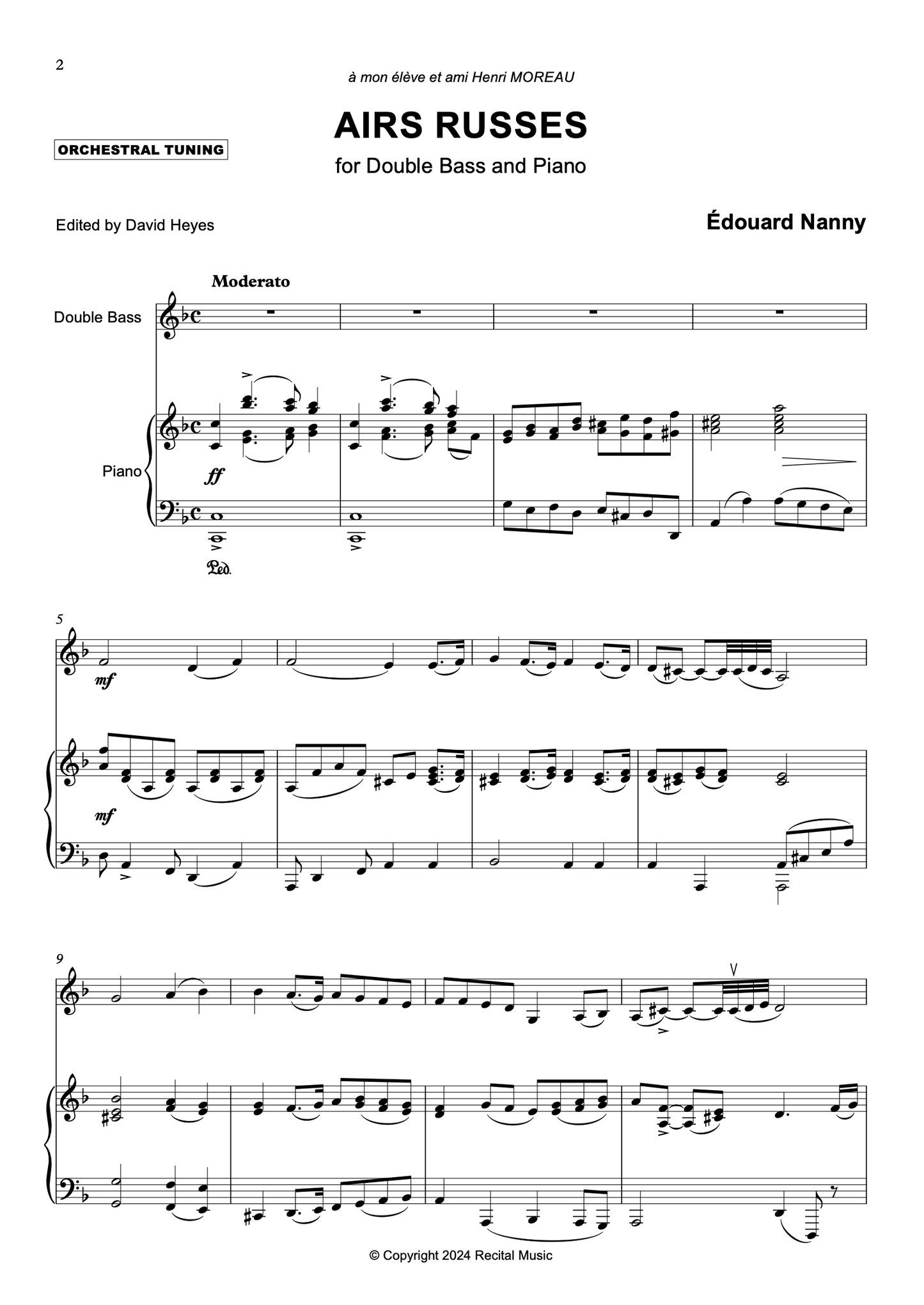David Heyes
Heritage Series Book 4 for double bass & piano (ed. by David Heyes)
Heritage Series Book 4 for double bass & piano (ed. by David Heyes)
Couldn't load pickup availability
About the Book
The Heritage Series features a wealth of exciting and innovative music from the 19th and 20th-century by some of the leading bassist-composers of the day. Each book includes three or four works for the intermediate-advanced bassist bringing music by these important figures in double bass history back to life in the 21st-century.
Book 4 features music from the UK, France, Germany and Czech Republic, mostly composed in the late-19th or early 20th-century, emphasising the lyrical and technical potential of the solo double bass, and is available with piano accompaniments for both solo and orchestral tuning.
Table of Contents
1. Vojta Kuchynka - Concert Waltz is a charming and elegant waltz, dating from the 1920s. It utilises the entire range of the bass, demonstrates great character and joie de vivre, and employs musical and technical challenges in equal measure. Unpublished until Recital Music’s first edition, the style is typically Czech with just a hint of Viennese flair and magic. The opening melody is reminiscent of the music of Johann Strauss II, and the waltz was performed many times by the composer.
2. Édouard Nanny - Airs Russes was first published in 1927 and was dedicated to Henri Moreau, a student of the composer. In one extended movement but in clearly defined sections, this is a fun work which utilises the entire range of the double bass including the highest harmonics. The main theme is march-like and full of confidence and bravado, contrasting music of a more elegant and song-like nature, demonstrating a composer who knew the solo potential of the double bass
3. Oswald Schwabe - Adagio Op.4 was first published in an edition for double bass or cello by Fr. Kistner in Leipzig towards the end of the 19th-century. Best described as salon music, but of the highest order, the piece exploits the lyrical and sonorous qualities of the double bass throughout much of its middle register, in music which is both elegant and stylish, reminiscent of a previous age.
4. J.P. Waud - Solo Study No.2 is from a suite of Six Solos Studies for the Double Bass with Pianoforte Accompaniment but the printed edition gives no information about the date of composition or the publisher. It emphasises the lyrical possibilities of the double bass, with a gently supportive arpeggio accompaniment, and offers musical and technical challenges in equal measure.
About the Composers
Vojta Kuchynka (1871-1942) gave solo recitals until the day of his retirement when he celebrated his 600th recital and was known as 'the Kubelík of the Double Bass', after the leading Czech violinist of the day Jan Kubelík (1880-1940). He was praised for his perfect technique, impressive harmonic work, interpretation, and tasteful transcriptions of classical works. Most of his recitals were in Bohemia or Moravia and one concert in Prague, reviewed in The Strad by Miss Windust, stated: "Alongside the brilliant performances of František Ondříček and Karel Hoffmann it was the admirable virtuosity of Vojta Kuchynka that made the deepest impression on me." He made the first Czech double bass recording for Parlophon, and Prague Radio broadcast recitals of his music to celebrate his 65th and 70th birthdays.
Édouard Nanny (1872-1942) was the leading French bassist of his generation, taught at the Paris Conservatoire for 20 years, and is recognised as the founder of the modern French double bass school. Alongside a wealth of transcriptions for double bass, Nanny also composed a series of original works which are worthy of revival in the 21st-century. His music is elegant and charming, exploiting the lyrical and technical possibilities of the double bass, and all are useful as both study and concert repertoire for the progressing bassist. An anniversary is a good time to reassess a composer’s work and Recital Music created new editions of a number of Nanny’s original works and transcriptions in 2022 to celebrate the 150th anniversary of his birth.
German bassist and composer Oswald Schwabe (1846-1909) was Professor of Double Bass at Leipzig Royal Conservatoire and Principal Bass of the Leipzig Gewandhaus Orchestra. He studied with Emanuel Storch and was a successful teacher in his own right. His works for double bass include a book of Technical Studies, Romance, Adagio and Cavatina, and he also transcribed a number of pieces for the double bass by Davidov and Raff.
Joseph Pritchard Waud (1833-1905) was born in Chelsea (London) on 30 July 1833, and in the 1861 census, he was 26 years old and described as “proffesser of music,” but in later census entries, he was a “teacher of music.” He married Eliza Walford in 1858 and they had three children, a son who died at the age of four or five and two daughters who also became music teachers. J.P. Waud’s biography on a family tree website states: He performed on the pianoforte, double bass, and violoncello, is engaged at the Crystal Palace in the permanent band of the company also at the Theatre Royal Haymarket, and at various concerts. He also has private teaching… Joseph Pritchard Waud died on 7 July 1905 in Hove, West Sussex at the age of 71.







